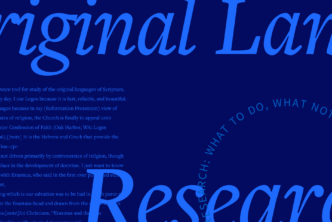Last time you checked the cover of your family Bible, it probably didn’t say “The Bible, by God.” Perhaps that’s why several good questions often arise early in faith conversations, such as:
- Who wrote the collected books of the Bible?
- What does the Bible itself say about those who wrote it?
- Did the authors think they were passing along God’s actual words?
In the beginning
Let’s begin with the easy part. We know the Bible was recorded by about 40 men (though that number is disputed) over the course of some 1,500 years, from three continents, and in three languages—Hebrew, everyday Greek (called “Koine”), and a dash of Aramaic (an ancient language originating in Syria).
Then, after centuries of wrangling and Holy Spirit intervention, the church finally settled on 66 books of history, wisdom, prophecy, ethics, rules for living, good advice, and encouragement from the pens of shepherds and scribes, kings and prophets, a fisherman and a tentmaker, and several mystery writers. Some were well educated and others, not so much.
Those are the basics. For a good introduction to “Who Wrote the Bible?” check out this video:
The answer is ‘both, and’
A related, bigger question hinges on the inspiration of Scripture. How did those men actually know what to write? Did they just think it up, or was something else going on? Were they taking dictation from the Lord? The answer to that question helps us understand where the Bible ultimately came from.
“The question ‘Who wrote the Bible?’ always has a double answer in the Bible,” wrote pastor and teacher John Piper. “Human authors wrote the Bible, and God wrote the Bible through the human authors. They actually held the quill that moved across the parchment, but what they wrote was ultimately what God wanted written.”1
That’s divine inspiration, and much has been written about it—though in truth it remains a bit of a mystery. Even so, libraries (and Google searches) are packed with volumes describing how we got the Bible, or how we know it’s authentic and without error. For now let’s take a quick look at the people who experienced that inspiration, from Genesis to Revelation.
Bylines we know, bylines we don’t
- In the beginning. Though honest scholars hold differing opinions, many traditional Jews and Christians credit Moses with the first five books (also called the Pentateuch or Torah). These books include Genesis (which means “Beginning”), Exodus (or “departure”), Leviticus (referring to the priests of Levi), Numbers (for the census mentioned in its opening verses), and Deuteronomy (or “second law”).
- And more Moses. Some Christian traditions (Scandinavian believers, for instance) simply name the first five books “First Moses Book, Second Moses Book,” and so on. And that makes sense, even if it were true that Moses did not write about his own death and funeral in Deuteronomy 34. Did he? Some believe his protégé Joshua may have added that part. Other scholars have their own theories about who wrote the Pentateuch, if it wasn’t Moses. For more on these origin questions, see A Christian’s Pocket Guide to How We Got the Bible, or How We Got the Bible, or Neil R. Lightfoot’s classic How We Got the Bible, all in fully searchable editions from Logos.
- Historical books. As we turn the pages, it’s even more difficult to nail down who wrote the next dozen historical books, which detail the early years of God’s chosen people and their struggles with faith. The authors of Joshua, Judges, Ruth, 1 and 2 Samuel, 1 and 2 Kings are lost to time and unknown. Yet most assume that Ezra did write 1 and 2 Chronicles, as well as the book named for him. Nehemiah wrote the book of Nehemiah. But how about the book of Esther? Again we’re not sure. Of course, that doesn’t keep us from being inspired by the queen’s bravery, “for such a time as this” (Esther 4:14).
- Wisdom books. Next, the much-quoted and beloved wisdom books include Job, the Psalms, Proverbs, Ecclesiastes, and the Song of Solomon. Authorship of Job is questioned. But King David probably wrote at least 73 of the psalms. Asaph is known to have written 12, the “sons of Korah” 11, Solomon two, and one each are credited to Moses, Ethan, and Heman. The other 50 psalms? Again, we’re not sure. Solomon also wrote the book of Ecclesiastes, most of Proverbs (along with Agur and Lemuel), and the Song of Solomon. And by the way, while Korah himself was known for rebellion (see Numbers 16), the “sons of Korah” were known for praise. It’s a fascinating story.
- Prophecy books. Authors of the next 17 books are easier to guess, since nearly all are named and credit given to a specific writer: the book of Isaiah to Isaiah, the books of Jeremiah and Lamentations to Jeremiah, the book of Ezekiel to Ezekiel, and so on. Add to that Daniel, Hosea, Joel, Amos, Obadiah, Jonah, Micah, Nahum, Habakkuk, Zephaniah, Haggai, Zechariah, and Malachi.
- On to the New Testament. And so endeth the 39 books of the Old Testament. In the New Testament, starting with the birth of Jesus Christ, we have a pretty good idea who wrote what—with one notable exception. Author “bylines” are sometimes included at the opening of the writings, or we have other evidence of authorship.
- The Gospels and Acts. The four Gospels bear the names of their human authors—Matthew, Mark, Luke, and John—but not in the actual text. Matthew’s Gospel, for instance, doesn’t open with a statement such as “I, Matthew, wrote this account.” So how can we know who wrote them? For one, the early church seems to have been unanimous in identifying Matthew, Mark, Luke, and John as the authors. Bible scholar Bill Mounce lays out the authorship arguments here. By the way, Luke, a physician and non-Jew (the only non-Jewish author among New Testament writers!) also researched and recorded the book of Acts. That makes him the most prolific New Testament writer, by word count. And you thought Paul wrote most of the New Testament?
- The letters. Next come 13 letters traditionally attributed to the Apostle Paul, who wrote the greatest number of New Testament books. (See above about Luke. And note that, in this case, we’re using the terms “letters” and “books” interchangeably.) These books are named for their intended recipients—whether groups or individuals: Romans, 1 and 2 Corinthians, Galatians, Ephesians, Philippians, Colossians, 1 and 2 Thessalonians, 1 and 2 Timothy, Titus, and Philemon.
- The Hebrews question: A head-scratcher. Who wrote the book of Hebrews? Scholars have wondered for centuries. Some say Paul, though that now seems unlikely. Others suggest the author may have been another early disciple. Clement? Timothy? Luke? Barnabas? Apollos? 2 Take your pick. We’re still not sure, and this video by Bible scholar Karen H. Jobes explains why not.
- Other letters, not Paul’s. Most agree that James (the half-brother of Jesus) wrote the book of James, though quite possibly with the help of a co-writer who was more fluent in Greek. The book may also have been completed after his death.3 Peter is thought to have written 1 and 2 Peter. But unlike Paul’s letters, these books are named for the authors, not the audiences. So we know the apostle John’s letters as 1, 2, and 3 John. And since John also wrote the book of Revelation, that makes him the third most prolific New Testament writer, after Luke and Paul. And finally, the short book of Jude was most likely written by, well, Jude.
Why 66 books of the Bible? How did we get here?
It took a while for the church to wind up with the collection of writings we have today. Why were some writings accepted in the final edition, and others rejected? Now that’s a long story. While the number of accepted Old Testament scriptures was settled well before the birth of Jesus, the process that ultimately gave us our New Testament lineup, or canon, included plenty of prayer, discussion, debate, and church councils. In the end, the early church much preferred genuine writings from original Christ followers—those who had met, known, or spent time with the Lord.
Digging (a lot) deeper
For those interested in a much more in-depth study, Logos also offers a special 5-hour online course on “How We Got the Old Testament” and a similar 4-hour course on “How We Got the New Testament.” Both are taught by Dr. Michael Heiser.
Mark your calendars
Athenasius, Jerome, Wycliffe, Gutenberg, and so many others had a part. Looking back, the process throughout history that gave us our Bible is punctuated by significant contributions of courageous people along the way. Here’s a brief (and approximate) timeline of how the biblical canon all came together:
1400–400 BC—Hebrew Old Testament written
250–200 BC—“Septuagint” Old Testament translated into Greek
AD 45–85(?)—New Testament written
AD 367—New Testament canon of 27 books listed by Bishop Athanasius
AD 397 and 419—Council of Carthage affirms 27-book New Testament canon
AD 400—Jerome’s Latin Bible becomes the standard text
AD 1382—Wycliffe produces first English translation
AD 1455—Gutenberg finishes the first printed Bible4
What Peter and Paul said
So we know who wrote much (though not all) of the Bible. What did the writers themselves say about the authenticity of the writings? Here are a few examples.
Peter called Paul’s letters “Scripture.” That’s significant, and must have influenced how others regarded those writings. (Note the words in bold, below.)
And count the patience of our Lord as salvation, just as our beloved brother Paul also wrote to you according to the wisdom given him, as he does in all his letters when he speaks in them of these matters. There are some things in them that are hard to understand, which the ignorant and unstable twist to their own destruction, as they do the other Scriptures. (2 Pet 3:15–16)
Paul also reminded Corinthian believers that “ … we impart this in words not taught by human wisdom but taught by the Spirit … ” (1 Cor 2:13). Notice how he’s claiming special authority there—for using words taught by the Spirit of God himself. That, too, is significant.
Paul also called Luke’s writing “Scripture” in this verse:
For the Scripture says, “You shall not muzzle an ox when it treads out the grain,” and, “The laborer deserves his wages” (1 Tim 5:18).
In this 1 Timothy passage the first quote is pulled from Deuteronomy 25:4, which was already counted as Scripture, while (note this!) the second quote is lifted directly from Luke’s Gospel account (Luke 10:7).
So in both these cases, early church leaders recognized writings other than the Old Testament as “Scripture.” Bold move!
The Bible on … the Bible
It’s good to remember that Jesus himself declared how “Scripture cannot be broken” (Jn 10:35), which is a pretty good indicator of what the Lord thought of the writings we now enjoy in our modern translations. But what does other Scripture say of itself?
All Scripture is breathed out by God and profitable for teaching, for reproof, for correction, and for training in righteousness (2 Tim 3:16).
So faith comes from hearing, and hearing through the word of Christ (Rom 10:17).
… take the helmet of salvation, and the sword of the Spirit, which is the word of God … (Eph 6:17).
For the word of God is living and active, sharper than any two-edged sword, piercing to the division of soul and of spirit, of joints and marrow, and discerning the thoughts and intentions of the heart (Heb 4:12).
Did the writers of the Bible know they were inspired?
Finally, did the original writers understand every word of what they recorded, and the significance of those words? Yes. Or no. They may have, or they may not have, entirely. They were, after all, human instruments. But either way, God surely used their personalities, perspectives, and writing styles.
Yet the phrase “Thus says the Lord” appears 417 times in the ESV translation of the Old Testament. That should give us a clue as to how those original writers felt about their message—and what they believed about the origin of their writing.
And then there was the prophet Daniel, who honestly shared his occasional confusion about what God was telling him and what he recorded on parchment. “I heard,” he wrote about the awe-inspiring vision he was shown, “but I did not understand” (Dan 12:8).
In Daniel’s defense, it’s hard to imagine not being overwhelmed by the visions God gave him. Perhaps we can relate to Daniel’s dilemma, even if we’ve never had the same experience.
And we need to know, because?
Even after all the scholarly speculation, all our timelines or author lists are not really the final word on the question of who wrote the Bible. Billy Graham was once asked that same question. The famous evangelist touched briefly on biblical inspiration, authorship, and how the writings had been collected. He quoted 2 Peter 1:21 (“For no prophecy was ever produced by the will of man, but men spoke from God as they were carried along by the Holy Spirit.”) But eventually he got to the point. “The real question, however,” he wrote, “is this: Why did God give us the Bible? The main reason was so we could know him—not just know some facts about him, but come to know him personally.”5
***
For help with studying each book of the Bible, get the Logos app! It’s free and available on mobile, web, and desktop.
Related resources

A Christian’s Pocket Guide to How We Got the Bible: Old and New Testament Canon and Text
Regular price: $5.99
- https://www.desiringgod.org/interviews/who-wrote-the-bible
- “Alternative proposals, from ancient to modern times, have included Barnabas (Tertullian), Clement of Rome (Calvin), Apollos (Luther), and Priscilla (Adolf von Harnack).” N. T. Wright and Michael F. Bird, The New Testament in Its World: An Introduction to the History, Literature, and Theology of the First Christians (London; Grand Rapids, MI: Zondervan Academic; SPCK, 2019), 713.
- https://zondervanacademic.com/blog/who-wrote-the-book-of-james
- Want more details? Here’s a more complete timeline that includes several other important milestones.
- https://billygraham.org/answer/who-wrote-the-bible-and-how-can-i-know-that-its-true/







